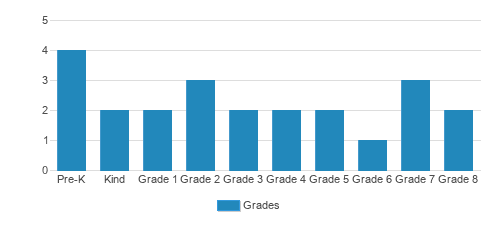Ocean Day School was founded in the fall of 1982 with the goal and idea of operating as a fully functioning non-profit organization.
Each child has value and has something unique to contribute to the classroom and school.
It is our mission to know our students intimately in order to develop their full potential.
Each child is special with his own way of learning.
Some are visual learners, some are auditory learners, others are kinesthetic learners.
Many rely on multiple modalities in order to succeed. We take no chances and waste no time.
We believe it is imperative to immerse children in multi modality learning at an early age.
We believe that language is the basis of all learning and that learning must take place in a systematic sequence with continuity throughout the grades.
School Overview
Religious Affiliation
Grades Offered
Grades Prekindergarten-8
Student Body
Total Students
23 students
Student Body Type
Co-ed
% Students of Color
25%
State avg.: 40%
Students by Grade

Academics and Faculty
Total Classroom Teachers
4 teachers
Student-Teacher Ratio
6:1
National avg.: 13:1
Average Class Size
10 students
Tuition and Acceptance Rate
Admission Deadline
None / Rolling
Yearly Tuition Cost
Source: National Center for Education Statistics (NCES)
Frequently Asked Questions
How much does Ocean Day School cost?
Ocean Day School's tuition is approximately $6,500 for private students.
When is the application deadline for Ocean Day School?
The application deadline for Ocean Day School is rolling (applications are reviewed as they are received year-round).
Recent Articles

Navigating Private School Finances 2026
Essential 2026 guide for parents on private school costs, financial aid, and planning strategies.

Preparation for Standardized Tests & College Admissions 2026
A 2026 guide for private school test prep and college admissions strategies, with insights, trends, and best practices for families and educators.

Mental Health & Wellness Support in Private Schools: Key Questions for Parents
Discover essential questions about mental health & wellness support in private schools before enrolling, with 2026 updates for informed decisions.






